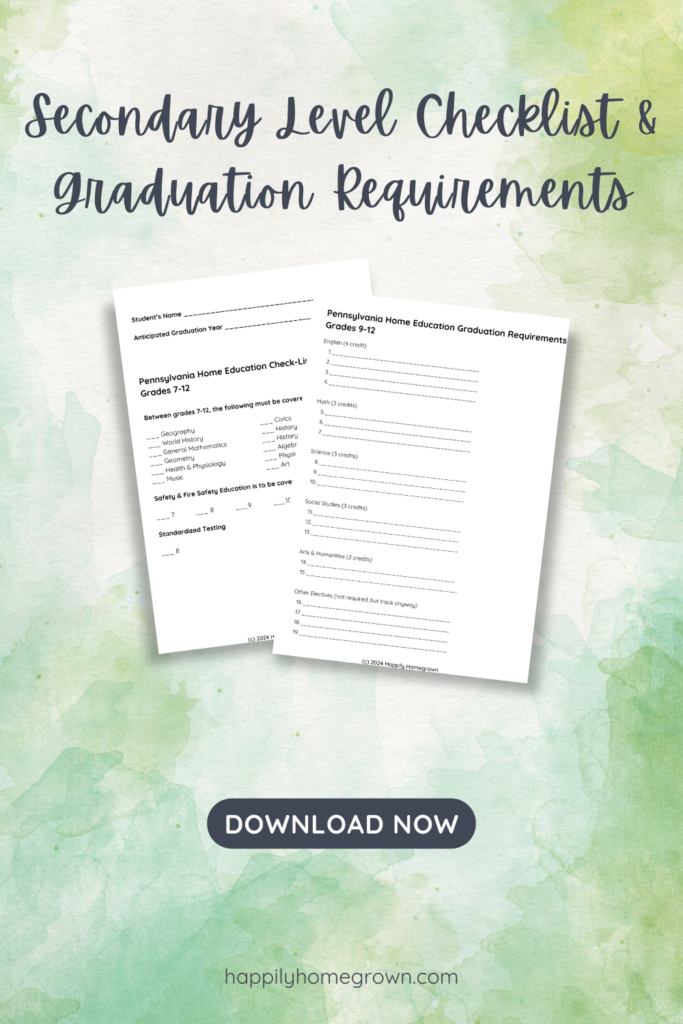Posts on Happily Homegrown contain affiliate links. When you make a purchase through an affiliate link, your price will be the same, but Happily Homegrown will receive a small commission. Thank you for your support!
Homeschooling high school and graduation requirements vary from state to state. All of my resources and experiences are with homeschooling in Pennsylvania. Requirements in your state may vary. Please become familiar with PA Home Education Law if you plan to homeschool in the state.

I have been an educator for over 20 years, and we are wrapping up our 10th year as homeschoolers in Pennsylvania. Currently, I have two children who are at the high school level and are working towards meeting the graduation requirements for PA homeschoolers. I am also an evaluator and have my first student graduating this year. Homeschool graduation requirements differ from what is expected of public school students or those in brick-and-mortar private schools.
Let’s start at the beginning. All sections in italics are direct quotes of PA Home Education Law.
Secondary Grade Levels
In Pennsylvania, the secondary level is defined as grades 7 through 12.
Many homeschoolers do not track actual grade levels since their children may be on various levels at the same time. For my family, we have always tracked the year based on what grade my children would have been in if they were in a traditional school setting. This has helped with things like placement in Scouts, knowing when to complete the standardized tests, and knowing what is elementary level and what is secondary level regarding checking off the boxes for subject requirements.
Secondary Subject Requirements
As per PA Home Education Law:
At the secondary school level, the following courses shall be taught: English, to include language, literature, speech and composition; science; geography; social studies, to include civics, world history, history of the United States and Pennsylvania; mathematics, to include general mathematics, algebra and geometry; art; music; physical education; health; and safety education, including regular and continuous instruction in the dangers and prevention of fires. Such courses of study may include, at the discretion of the supervisor of the home education program, economics; biology; chemistry; foreign languages; trigonometry; or other age-appropriate courses as contained in Chapter 5 (Curriculum Requirements) of the State Board of Education.
Read that section twice.
The law does not say you must complete specific courses in specific years. In fact, there is nothing in the law that says you need to complete specific courses at all! Each subject must be covered in some way at some point between grades 7-12.
PA Graduation Requirements for Homeschoolers
The following minimum courses in grades nine through twelve are established as a requirement for graduation in a home education program:
- Four years of English.
- Three years of mathematics.
- Three years of science.
- Three years of social studies.
- Two years of arts and humanities.
Keeping Track of Graduation Requirements
To make things as simple as possible, I have created a simple checklist and informal transcript to help you see what your student has accomplished during the secondary years and in preparation for graduation.
Using the Secondary Level Checklist
I use the Secondary Level Checklist at the end of each school year when I’m conducting an evaluation, but you can use it as you pull together your portfolio or even for planning the upcoming academic year.
Simply check the box next to any subjects you have covered in grades 7-12. This doesn’t mean a full-year, formalized curriculum in a given subject.
For example:
A field trip to Independence Hall in Philadelphia means you can check the box for US History and Pennsylvania History. Listening to the radio on a regular basis has you checking off the box for music. And don’t forget those swim lessons can check off the requirement for Physical Education. If you completed the Citizenship merit badges with your Scouts BSA Troop, then you can certainly check those boxes for Civics too!
Before you even realize it, your student will have checked off all of the boxes for the required subjects between seventh and twelfth grade.
The Secondary Level Checklist also has spots for you to check off that you cover Safety/Fire Safety each year and a place to check off the 8th-grade standardized test requirement.
Meeting the Graduation Requirements
Meeting the graduation requirements takes a little more planning but only because each subject requires a specific number of years.
I highly recommend the book Cure the Fear of Homeschooling High School by Ann Karako. This is a great guide for planning out all four years for your student and collating your state guidelines with what college admissions or other post-secondary institutions want to see.
Once you have your high school plan in place, you can write in the names of your courses on the Secondary Level Checklist. Don’t forget to make notes on when your student will take the class and how many credits will be awarded.
A full-year course is one credit.
How to Calculate 1 Credit
When determining what equals 1 credit, you have some options:
- complete over 3/4 of a textbook
- logged entries of over 120 hours of study and/or activities related to the subject area
- successful completion of a college course
- passing score on an Advanced Placement exam
You do NOT need to prove to anyone how you determined that a full-year course has been completed. You are the supervisor of the home education program.
If you are using an outside diploma program, you do have to follow their additional guidelines.
Graduation Requirements
Recording the courses and quickly seeing how things add up takes some of the stress out of homeschooling high school.
Many families are surprised by how straightforward the high school graduation requirements are for homeschoolers to receive a Supervisor-Issued Diploma.
Don’t make homeschooling high school harder than it needs to be by overthinking everything, and comparing what your student is doing to that of their public school peers. This is something I need to remind myself of often.






Leave a Reply